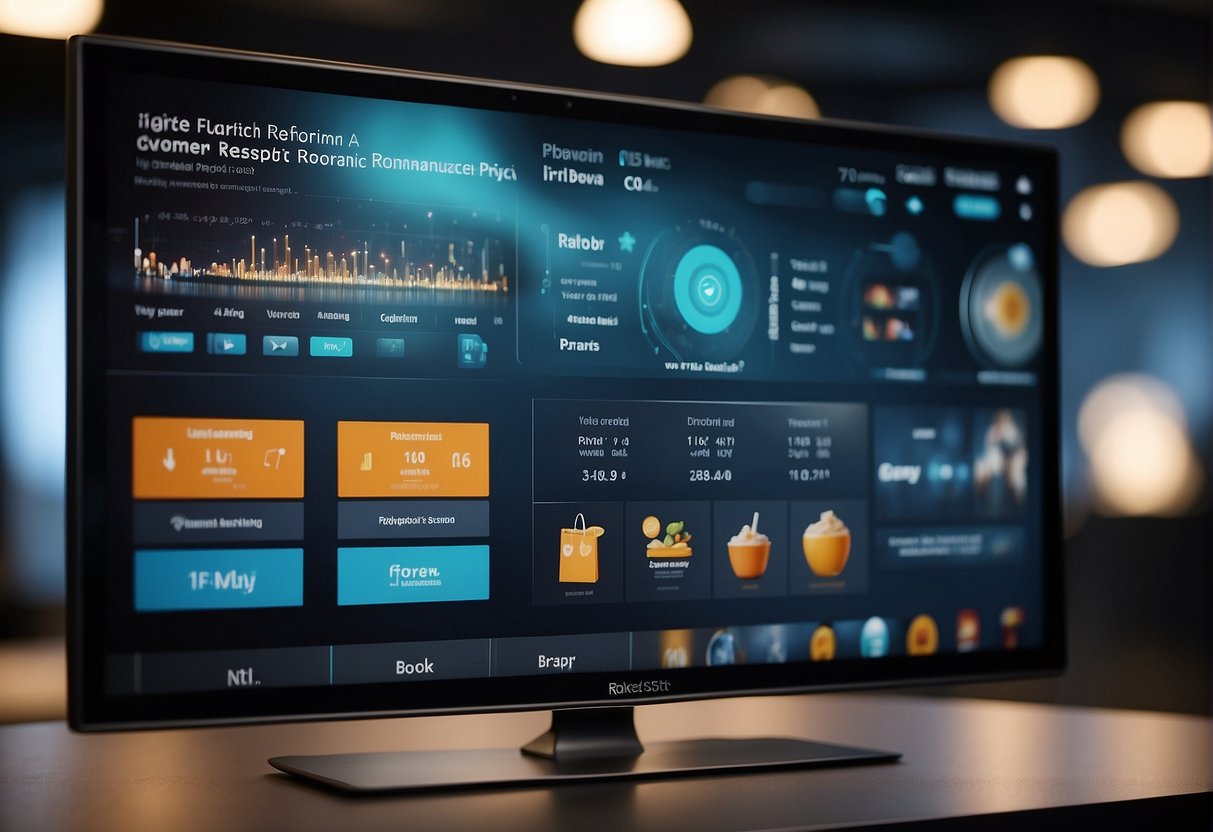AI-driven marketing personalization strategies are becoming increasingly popular as businesses strive to create more meaningful and relevant experiences for their customers. With the vast amount of data available, AI can help marketers analyze customer behavior and preferences to tailor their marketing efforts accordingly. This approach can lead to increased customer engagement, loyalty, and ultimately, revenue.
One of the key benefits of AI-driven marketing personalization strategies is the ability to create highly targeted and relevant content for individual customers. By analyzing data such as purchase history, browsing behavior, and social media activity, AI can help marketers understand each customer’s unique preferences and interests. This allows them to create personalized marketing messages that resonate with the individual, rather than generic messages that may not be relevant.
Another advantage of AI-driven marketing personalization strategies is the ability to automate certain tasks, such as email campaigns and social media posts. This not only saves time and resources, but also ensures that the right message is delivered to the right person at the right time. With AI handling the more mundane tasks, marketers can focus on developing creative and engaging content that truly resonates with their audience.
Foundations of AI-Driven Marketing

Personalization has become an essential aspect of marketing, and with the advent of artificial intelligence (AI), marketers can now offer more personalized experiences to their customers. AI-driven marketing personalization strategies are designed to leverage machine learning algorithms to analyze data and automate decision-making processes. In this section, we will discuss the foundations of AI-driven marketing and the role of data analytics in personalization.
Understanding AI and Machine Learning
AI refers to the ability of machines to perform tasks that typically require human intelligence. Machine learning (ML) is a subset of AI that involves training machines to learn from data without being explicitly programmed. ML algorithms can analyze large datasets and identify patterns that can be used to make predictions and automate decision-making processes.
In the context of marketing, AI and ML can be used to analyze customer data and create personalized experiences. For example, an e-commerce website can use ML algorithms to analyze customer browsing behavior and recommend products that are relevant to their interests.
The Role of Data Analytics in Personalization
Data analytics plays a crucial role in AI-driven marketing personalization strategies. By collecting and analyzing customer data, marketers can gain insights into customer behavior and preferences. This data can be used to create personalized experiences that are tailored to each customer’s needs.
Data analytics can also help marketers identify patterns and trends that can be used to improve marketing campaigns. For example, by analyzing customer data, marketers can identify which channels are most effective for reaching specific customer segments.
Privacy and Ethical Considerations
As with any technology, AI-driven marketing personalization strategies raise privacy and ethical concerns. Marketers must ensure that they are collecting and using customer data in a responsible and ethical manner. This includes obtaining customer consent for data collection and being transparent about how customer data is being used.
Data privacy is also a concern, and marketers must ensure that customer data is stored securely and protected from unauthorized access. Additionally, marketers must be careful not to use customer data in a way that could be considered discriminatory or unethical.
In conclusion, AI-driven marketing personalization strategies have the potential to revolutionize the way that marketers interact with customers. By leveraging AI and machine learning, marketers can create personalized experiences that are tailored to each customer’s needs and preferences. However, it is important to consider privacy and ethical considerations when implementing these strategies.
Strategies for Personalization

Personalization is a crucial aspect of modern marketing, and AI-driven marketing personalization strategies have become increasingly popular in recent years. By leveraging customer data and utilizing predictive analytics, businesses can create targeted campaigns that deliver personalized experiences to their customers. Here are a few strategies for personalization that businesses can use to enhance their marketing efforts:
Leveraging Customer Data for Personalized Experiences
One of the most effective ways to personalize marketing efforts is by leveraging customer data. By collecting and analyzing data such as purchase history, browsing behavior, and demographic information, businesses can gain valuable insights into their customers’ preferences and interests. This data can then be used to create targeted campaigns that deliver personalized experiences to each individual customer.
Implementing Dynamic Content and Personalized Emails
Dynamic content and personalized emails are other effective strategies for personalization. Dynamic content allows businesses to tailor their website content to individual visitors based on their browsing behavior and other data. Personalized emails, on the other hand, allow businesses to send targeted messages to their customers based on their preferences and behavior.
Utilizing Predictive Analytics for Targeted Campaigns
Predictive analytics is another powerful tool for personalization. By analyzing customer data and using machine learning algorithms, businesses can predict which customers are most likely to make a purchase or take a specific action. This information can then be used to create targeted campaigns that deliver personalized experiences to each individual customer.
Overall, these strategies for personalization can help businesses create more effective marketing campaigns that deliver personalized experiences to their customers. By leveraging customer data, implementing dynamic content and personalized emails, and utilizing predictive analytics, businesses can create targeted campaigns that resonate with their customers and drive results.
Enhancing Customer Engagement

In the age of AI-driven marketing personalization, enhancing customer engagement has become a top priority for businesses. By leveraging the power of AI, businesses can create a seamless customer experience that is tailored to each individual customer’s needs and preferences.
Creating a Seamless Customer Experience
One of the key benefits of AI-driven marketing personalization is the ability to create a seamless customer experience. By analyzing customer data, businesses can gain insights into each customer’s preferences and behavior, allowing them to deliver personalized content and recommendations that are relevant and engaging.
To create a seamless customer experience, businesses must focus on delivering consistent and relevant messaging across all channels, including email, social media, and website. By creating a unified customer experience, businesses can build trust and loyalty with their customers, ultimately driving sales and revenue.
Chatbots and Conversational Marketing
Chatbots and conversational marketing are becoming increasingly popular in the world of AI-driven marketing personalization. By using chatbots and other conversational tools, businesses can engage with customers in real-time, providing personalized recommendations and support.
Chatbots can be used to answer common customer questions, provide product recommendations, and even process orders. By automating these tasks, businesses can free up their customer service teams to focus on more complex issues, while still providing a high level of customer support.
Content Creation and Optimization
Content creation and optimization is another key area where AI-driven marketing personalization can help businesses enhance customer engagement. By analyzing customer data, businesses can gain insights into which types of content are most effective at engaging customers, and tailor their content strategy accordingly.
AI can also be used to optimize content for search engines, ensuring that it is easily discoverable by potential customers. By creating high-quality, relevant content that is optimized for both humans and search engines, businesses can drive traffic to their website and increase customer engagement.
Overall, AI-driven marketing personalization offers businesses a powerful tool for enhancing customer engagement. By leveraging the power of AI to deliver personalized content and recommendations, businesses can create a seamless customer experience that drives loyalty and revenue.
Measuring Success and ROI

Successful AI-driven marketing personalization strategies require accurate measurement of their effectiveness. This section outlines the key performance indicators (KPIs) that companies should track to measure the success and ROI of their personalization efforts.
Key Performance Indicators for Personalization
ROI is the most important KPI for measuring the success of AI-driven marketing personalization strategies. Companies should track the ROI of their personalization efforts by analyzing the impact of personalized campaigns on revenue growth. Other KPIs that companies should track include click-through rates, conversion rates, and customer loyalty.
Conversion Rates and Customer Loyalty
Conversion rates are an essential KPI for measuring the success of AI-driven marketing personalization strategies. Companies should track conversion rates to determine the effectiveness of personalized campaigns in driving sales and revenue growth. Customer loyalty is another critical KPI that companies should track to measure the success of their personalization efforts. Companies can measure customer loyalty by analyzing customer retention rates and repeat purchase rates.
The Impact of AI on Revenue Growth
AI-driven marketing personalization strategies can have a significant impact on revenue growth. By analyzing customer data and behavior, companies can personalize their marketing campaigns to target specific customer segments effectively. AI can also help companies optimize their marketing campaigns to improve conversion rates and customer loyalty. Companies that implement AI-driven marketing personalization strategies can expect to see significant improvements in revenue growth and ROI.
Overall, measuring the success and ROI of AI-driven marketing personalization strategies requires accurate tracking of KPIs such as conversion rates, customer loyalty, and revenue growth. By analyzing these metrics, companies can optimize their personalization efforts to drive sales and revenue growth effectively.
Future Trends and Challenges

As AI-driven marketing personalization strategies continue to evolve, there are several trends and challenges that are emerging. In this section, we will discuss some of these trends and challenges and how they are likely to shape the future of AI-driven marketing personalization.
Emerging Technologies in Personalization
Advancements in technology are driving new and innovative ways to personalize marketing efforts. AI algorithms, natural language processing, and sentiment analysis are just a few of the technologies that are being used to create more personalized experiences for customers. These technologies allow marketers to analyze large amounts of data and gain insights into customer behavior and preferences.
One emerging technology that is gaining traction is hyper-personalization. This approach uses machine learning algorithms to analyze customer data in real-time and deliver highly personalized content and recommendations. This technology is expected to become more prevalent in the coming years as marketers look for ways to stand out in a crowded market.
Addressing Bias and Transparency in AI
One of the biggest challenges facing AI-driven marketing personalization is bias. AI algorithms are only as good as the data they are trained on, and if that data is biased, the algorithm will be biased as well. This can lead to unintended consequences and negative customer experiences.
To address this challenge, marketers need to be transparent about how they are using AI and ensure that their algorithms are as unbiased as possible. This requires a deep understanding of the data being used and a commitment to ongoing testing and refinement.
The Evolution of Customer Expectations
As AI-driven marketing personalization becomes more prevalent, customers are likely to expect more personalized experiences across all touchpoints. This means that marketers will need to continue to innovate and find new ways to deliver highly personalized content and recommendations.
One way to meet these evolving expectations is to focus on creating experiences that are seamless and intuitive. This requires a deep understanding of customer needs and preferences, as well as a commitment to ongoing testing and optimization.
In conclusion, AI-driven marketing personalization is a rapidly evolving field with many exciting opportunities and challenges. By staying on top of emerging technologies, addressing bias and transparency in AI, and meeting evolving customer expectations, marketers can create highly personalized experiences that drive engagement and loyalty.



